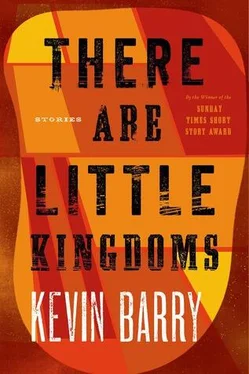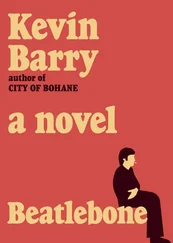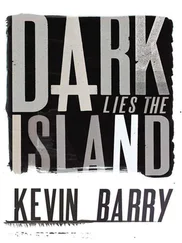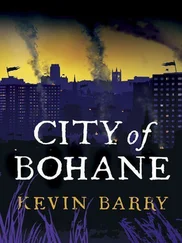‘If you wish to hear details of the Exchange’s new evening call rates, please press one.’
I threw my eyes to the heavens.
‘If you would like a top-up for your free-go, anywhere-anytime service, please press two.’
I refused to carry one of those infernal contraptions.
‘If you wish to discuss employment opportunities at the Exchange, and to hear details of our screening arrangements, and of our physical and mental requirements for operatives, voice engineers and full-blown agents, please press three.’
I’d rather work in the sewers.
‘If you seek an answer to the sense of vagueness that surrounds your existence like a fine mist, please press four.’
I pressed four. A happy voice exploded in my ear. It was the voice of heartiness. It was the voice of a resort manager at a mid-priced beach destination. It was a kind of stage Australian.
‘Watcha!’ it said. ‘Feelin’ kinda grooky, mate? What ya wanna do, ya wanna go down yar garden, ya wanna go down them fruit trees, and ya wanna find the ladder that’s hidden there, right? Then what do ya do? YA BLOODY WELL CLIMB IT!!!’
The phone cut out — dead air. I proceeded directly to the garden. I put on a pair of plimsolls. I removed the handkerchief from my head. I walked down to the dense, summer tangle of fruit trees. I pulled back the hanging vines, parted the thick curtains of growth, and I could see nothing, at first, but then my eyes adjusted to the dappled half-light and I made out a dull, golden gleam, and yes, it was a ladder. I pushed my way through, thorns snagging on my trousers, and I began to climb. Slowly, painfully, I ascended through the thick foliage and I came to the treetops, and a view of my suburb, its neat hedges and mossy slate rooftops, and I climbed on, and I went into the white clouds and I climbed still higher, and the ladder rose up against rocky outcrops. I found that I was climbing past the blinding limestone of a cliff-face, and at last I got to the top, and I hauled myself up onto the salty, springy turf.
I walked. The marine breeze was pleasant, at first, after my sweaty efforts, but soon it started to chill me. It was a bright but blowy spring day, and the first of the cliff-top flowers were starting to appear: the tormentil, the early orchids, the bird’s foot trefoil. A milky white sea lapped below, it had latent aggression in it, and I looked down the stretch of the coastline and oh, I don’t know, it may have been Howth, or Bray, or one of these places. There was nobody around. Black-headed terns battled with the wind and rose up on it, they let it turn and throw them: sheer play. I walked, and I concentrated on clearing my mind. I wanted to white out now. I wanted to leave all of it behind me again.
Yes I walked, I walked into the breeze, and after a time I came to one of those mounted telescopes, the kind that you always get at the seaside. I searched in my pocket, found a half-crown, inserted it, and the block slid away on the eyepiece and I looked through. There appeared to be a problem with the telescope — it was locked in place, it wouldn’t swivel and allow me to scan the water, the shore, the sky. It was locked onto a small circle of grey shingle, just by the water’s edge, and I saw that it was a cold and damp day down there. It was winter by the tide-line, it was springtime on the cliffs.
I kept looking, and she appeared. She crouched on her heels and looked out over the water. She wore a long coat, belted, and a wool scarf about her throat. It wasn’t a close-up view but even so, I could see that age had gone on her. I could see the slump of adult weariness. The view was in black and white, flickering, it was old footage, a silent movie, and I knew that the moment down there had passed, too, and that she herself was long gone now. If I was to find her again, it would be pure chance, a random call coming through the Exchange. And I would try to explain, I would. I’d try to tell her why it had happened the way that it did, but my words would sink beneath the waves, where shock-bright colours surprise the gloom: the anemones and starfish and deadman’s fingers, the clam and the barnacle, the brittlestar.
The eyepiece blacked out and I walked back the way that I came. I descended the ladder to an autumn garden. Russets and golds and a bled, cool sky: turtleneck weather. My favourite time, the season of loss and devotion.
Wireless ten years, at large in the ancient house, prey to odd shudders in the small hours, Freddie Bliss had more or less given up on the idea of sleep. Subsequently he had gone a little daft. But sleep? No. He had no time for it anymore. Life is precious — grab as much of it as you can. This was the Freddie Bliss philosophy.
‘They’ve stopped the night outside High Hesket,’ said his daughter, Angelica, a large peach-skinned woman in her flailing forties. ‘They’ve bunked up at a Roadsleeper and they’ll be heading here first thing. There’s a crew of twelve. There are two trucks for equipment. They want to know if there are any characters among the builders.’
‘What builders?’
‘Well, this is the problem, isn’t it? I wonder is it too late to get Joe up? He’s larger than life, Joe. But there’s the question of his tags, isn’t there?’
‘His what?’
‘TAGS! His probation. Though they might make an exception for TV.’
‘Jailbird, is he? Another one, Angel?’
‘Miscarriage of justice,’ she said, and with a noiseless swivel of her powerful shoulders she swung the giant mallet hammer at an internal wall.
‘That bitch was psychotic! Joe acted purely in self-defence. Of course he had previous, I grant you.’
Freddie Bliss mouthed a soft note of sympathy, and he continued his search for drink.
‘It’s an outrage, Daddy, what these old bastards in the courts get away with. Whoremasters, the lot of them!’
‘What’s he inside for?’
‘Are you listening to a single word? Turn your ears on! I said PROBATION! I said MISCARRIAGE OF JUSTICE!’
‘Oh!’ said Freddie Bliss. ‘You needn’t tell me! I lost all faith in the legal system in 1974, Angel. Remember the business with the gypsies? Remember whose side the courts took? Well! Never again, I said. Never again will I submit to those dogs.’
Angelica put down the mallet hammer, wiped her brow, and paced the faded linoleum of the kitchen floor. She was in a condition of high wrath but she stopped, suddenly, and stared off into space — she had been arrested by gentle thoughts. She closed her eyes, and held her head at a respectful incline. She slid a stockinged toe up her calf to attend an itch.
‘Joe,’ she whispered, ‘is a gentle, oh a gentle man! He is so loving, Daddy, and kind. It’s the small things that he does, the tiny things! They make the man. I can actually say that I consider myself a very, very lucky woman.’
‘I’m delighted for you, dear. It’s time you had some luck. I’m afraid you’ve rather been through the wringer.’
Dapper Bliss rummaged among the bottles for something to stiffen the coffee. Angelica wasn’t a terrific one for sleep either, and now the pair of them were often to be found, late on, arranging a brew, as the night birds fluted outside, and the old shale earth sent up its black breaths. She had come home, at last, to settle. The plan was to turn the place into a guesthouse. But no, not a guesthouse. If he said guesthouse, she flew into a rage.
‘I’m not talking a bloody B&B! I’m talking A BOUTIQUE FUCKING HOTEL!’
The Bliss place was big enough, certainly, and it had bags of character. The countryside was bleak but impressive: fells and stone hills and sudden gorges. Angelica felt there were opportunities with walkers, dreamers, romantic types. She admitted there was work to be done. The house had animals in its walls. It had structural concerns. There was the wafting presence of the Bliss ancestral dead.
Читать дальше












